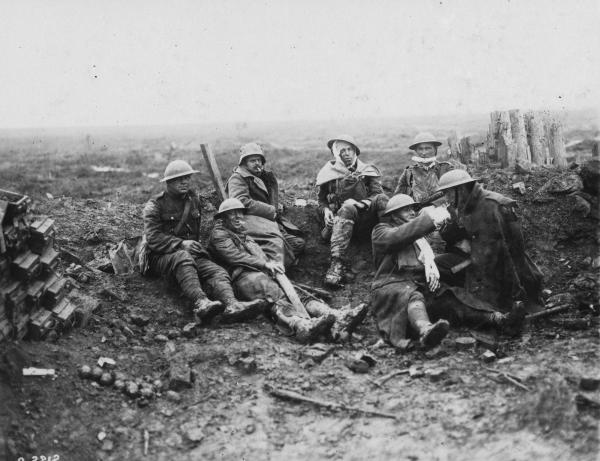
War, the Prussian military theorist Carl von Clausewitz famously observed, is a continuation of politics by other means. Yet there are times, writes Canadian military historian Tim Cook, when the reverse is true and politics becomes “a continuation of war by any means.” He makes the observation in his compelling new book, Warlords: Borden, Mackenzie King, and Canada’s World Wars, in which he demonstrates this truth and other important lessons on how political leaders affect — and are affected — by war.
Cook has a deserved reputation for combining solid research and analysis with the flair and brio of a natural storyteller. Through his day job as the Great War historian at the Canadian War Museum and four previous books on our conflicts, he is known primarily for his expertise on the military. But he also excels at interpreting how political and military considerations intersect at the highest levels, and does so in an even-handed manner.
Here, Cook’s material is leadership in war, and the most terrible, bloody wars at that. As Cook notes, the official portraits of Borden and King in the House of Commons are the only two prime ministerial paintings whose plaques do not list their dates of overall service. Instead, Borden’s caption reads “World War I Leader, 1914-18,” while King’s is listed “World War II Leader 1939-45.” Though each served as prime minister for much longer, their leadership through these great fires defines them.
Despite differences in personality and party politics — Borden was a Conservative, King a Liberal — their approach to the challenges they faced were often similar. Both faced a yawning divide between Quebec and the rest of the country on key issues. Each had to assuage pressure from conflicting wings in their own parties. And Cook sees similarities in the way that, even in the heat of war, partisan politics factored into their strategic considerations. His descriptions of political trench warfare show a brand of politics at times even nastier than today, shattering any misplaced nostalgia for a kinder, gentler atmosphere we imagine prevailed in times of national crisis.
Is any contemporary insult even remotely close to Ontario Premier George Drew’s 1944 gibe at General A.G.L. McNaughton — a distinguished soldier turned federal Liberal politician — that “I would not insult a yellow dog by calling you one”? And while much is made of Prime Minister Stephen Harper’s reportedly private contempt for the Liberal Party, consider the seemingly mild-mannered King, for whom, Cook reports, “the dark danger of Conservatism was a hyperbolic narrative that King had constructed for himself, and others, over a lifetime, and that he never abandoned.”

Today, Borden is remembered, if at all, as a stodgy, anglophile WASP who never reflected a genuine emotion he could possibly avoid. King, despite being Canada’s longest-serving prime minister, is recalled principally for the dullness of his public persona that contrasted with his private fondness for séances and one-sided conversations with his dead mother and dog. Neither man was charismatic; each seemed to ascend to their party’s leadership by accident of circumstances.
But as Cook demonstrates, both were shrewder than often presumed — and cold-blooded when they saw it as the only way to achieve their goals. King sought to eviscerate the good reputation of Governor-General Sir Julian Byng (Lord Byng of Vimy) after Byng refused his request to dissolve Parliament and call an election in 1926. (This came after King refused Byng’s proposal that he step down after a 1925 election that saw the Liberals win only 99 of the 245 seats in the House of Commons, while the Conservatives won 116.) After continuing to govern for close to seven months, King finally asked Byng to dissolve Parliament. Byng refused, and instead asked the Conservatives, led by Arthur Meighen, to form a government. The new government collapsed days later.
In the ensuing campaign, King shamelessly took after Byng, a former commander of the Canadian Corps during the Great War who was much loved by his soldiers. King portrayed him as the principal agent of the British “in an imperial conspiracy to claw back control of the Canadian government.” Never mind that there was no basis to that. It made for an effective election tool, and King won handily.
Borden and King fretted about their places in history, fuming when they weren’t given what they considered their due. Borden felt he played a key secondary role in the 1919 Paris peace conference — to some extent, he did — and sulked when the multi-volume history of the conference was published and his name was not even listed in the index. King, attending the first-ever plenary session of the United Nations in San Francisco in 1945, gave a speech, Cook writes, full of “his regular, moralizing bunk, and had little impact.” Despite that, King later wrote privately that many of the guiding principles of the UN could be found in an earlier book he had written.
The best historical narratives offer lessons that are relevant to our own time. An important cautionary — though unstated — lesson of Warlords is how easy it is for political leaders to get caught up in day-to-day governing and political manoeuvring to the point of losing track of the bigger picture.
In Borden’s case, the most startling example, Cook notes, is that “in his personal diary, there is not a single reference to the battle of Passchendaele,” where “sixteen thousand of his countrymen were killed and maimed in the fighting.” With King, the example of his distance — and absence from the centre of Allied decision-making — is even more shocking: the first he learned of D-Day, the Allied invasion of Europe, on the day itself, was when he was awakened and told of the engagement of Canadian forces.
But Cook makes clear it would be wrong to conclude that either man was ineffective or ill-intentioned overall. His portraits of Borden and King portray fundamentally decent, complex and flawed men struggling with global catastrophes of a scale and scope they could never have prepared for when they entered politics. They make mistakes, sometimes let their worst partisan instincts prevail, and are frequently underestimated by opponents and other leaders. But ultimately, their accomplishments bequeathed legacies that are far more positive.
Between them, the two men introduced profound changes to the way Canada is governed — and the way its economy functions — that shaped the country we know. They include industrialization, expansion of voting rights, the introduction of federal income tax (under Borden) and steps taken by both men to enhance Canada’s status as an independent nation. They also, it must be noted, presided over Canada’s successful prosecution of a war. As war leaders, they were victorious.
Those achievements are measured against the rivers of blood that were shed by young Canadians, killed and maimed in battles fought in places many of them had never heard of until they arrived there. The prime ministers who sent them often appeared cold, aloof and withdrawn, perhaps because they convinced themselves they had to be. “Borden and King both, in unique ways that reflected their different personalities, saw what had to be done, and then did it,” Cook concludes. In this masterful book, he has taken two key figures from increasingly distant but ever-important chapters of our history, and given them relevance, a fair hearing — and context from which we all can learn.
Photo: Shutterstock by Billion Photos







